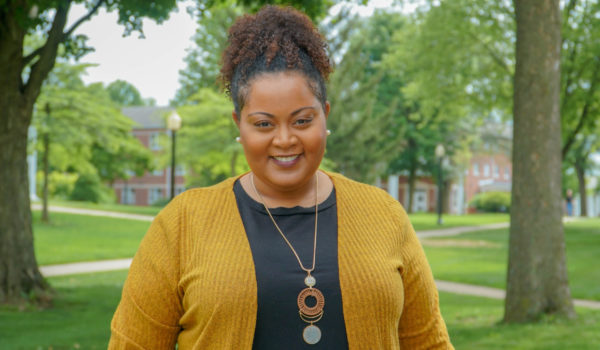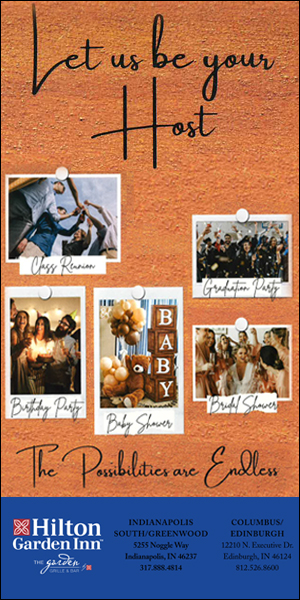
Maegan Pollonais
By Sara McAninch // Photography submitted by Franklin College
As the child of immigrants and someone who was born in the United States but then primarily raised in another country, Maegan Pollonais brings a unique lens and experiences to her new role as the director at the Center for Diversity and Inclusion at Franklin College.
Born in Brooklyn, New York, Pollonais and her family moved to her parents’ native Trinidad and Tobago when she was 7. At age 18, she came back to the States to get her undergraduate degree at State University of New York at Plattsburgh, initially to study criminology but eventually focusing on sociology and music.
“When I came from Trinidad and Tobago, I never knew how to study or perform music,” says Pollonais. “I had a professor who pointed me toward opera and solo performance. I tried out for a choir, but my professor prompted me to be a solo performer.”
In the following years, Pollonais continued to develop her talents as an opera singer through her graduate and doctoral studies. (She has a master’s degree in music from Bowling Green State University in Ohio and a doctorate in music with a concentration in educational psychology from Ball State University.) After graduation, she worked at Manchester University for a few years, where she was the assistant director of student diversity and inclusion.
When Pollonais accepted the role at Franklin College earlier this year, she did so primarily to move closer to her partner, Justin, but also because she wanted to “work with a community that has a lot to offer,” she says.
“Franklin is ideally placed because it’s right outside of Indianapolis. There’s a huge diverse population built into the surrounding area. I thought my expertise would be valuable to the students, faculty, staff and community,” she says.
When she’s not working with students, faculty and staff, Pollonais loves to watch Korean dramas and Bollywood films, which she appreciates because of her mom’s Indian roots. She enjoys eating sushi and spending time with her mixed-breed dog, Barkley the Great. Her first passion, however, is singing.
“I love the stage. I grew up singing in a choir. I’ve been a singer since before I could speak,” says Pollonais, who became classically trained at age 17.
What does your role entail as the director for the Center of Diversity and Inclusion at Franklin College?
A lot of my job focuses on student programming. Students, especially ones who have been excluded historically, don’t have a sense of belonging when they come to a predominantly white institution. A sense of belonging is huge to their success. A lot of the programming I’m implementing will create a space for students of color so they feel they belong here because it will speak to their culture and the value they bring as people.
My role is about interacting with all the students, so I’m also excited about working with the general population. I will help them learn how to intermingle with those from other countries and domestic students of color. Part of that is helping them understand how to value all diversity and inclusion. We must be culturally competent and have the ability to work with diverse populations.
I want to be a cheerleader for my students, and I want to empower them. When we empower them, that’s when the magic happens. We give them the breath to use their own voices, and when they use their voices then they can advocate for their own needs. Kids want to be future leaders, so we have to encourage them to face the issues they’re facing now and what they’ll encounter in the future. Students can change the world so that it’s what they want to live in instead of what’s always existed.
In addition, I’ll work with faculty and staff to help drive a campus culture of inclusion. When we create spaces for people to thrive – and they really thrive – that’s what I want for diversity.
Everyone has a diversity story; you don’t have to be part of a racial or ethnic group to have one. Learning how to identify, honor and respect individuals with different identities is important.
What are some of your short- and long-term goals for your work?
I’m really interested in working with the general student population. I want to know that when our students graduate, they are culturally competent. To get there, I want to start diversity and inclusion trainings, orientations and workshops so they graduate understanding more about white privilege, why Black lives matter, what pronouns to use, and the importance of honoring someone’s identity, to name a few. How we do that is through programs, connections on campus with different organizations, and other things like that.
One of my short-term goals is to implement Students of Color orientation, which is a first for the college. The idea is students arrive on campus before classes start to get to know people, especially those individuals who are their touchpoints if something goes wrong.
I’m also starting diversity and inclusion training for student leaders, such as resident advisers and our launch mentors. The instruction will have a lot of foundational teaching that focuses on things like why diversity is important, how it benefits them, vocabulary and terminology, and how to become an ally.
Long term I want to roll out safe space training for LGBTQIA students. In addition, I plan to introduce a module on how to have conversations around racial issues.
What does diversity, equity and inclusion mean to you? Why is it important?
There are two sides to this: the practical and the human perspective. On the practical side, diversity is always around us. It’s always been part of the American culture. Inclusion is also important. When you have more diverse people and you include them in situations, problems are solved better. It’s been proven that the more diverse your workforce, for example, the more productive you are as a business.
On the human perspective side, we are so diverse in this country. I’m not an immigrant, but I have that lens because I grew up in another country. America is a combination of so many people from other countries. It’s important to honor what they bring here and contribute. For example, how many people love Mexican food or Indian delicacies? We have to value people for who they are, what they’ve done and how they make our lives better.
If we are to really understand, unite and go forward as a country, we need to understand it: our history, who we are and where we came from.
What are some things – big and/or small – that everyone can do to foster a welcoming and inclusive community?
It all starts with removing our biases. We all have them. What prevents people from feeling that welcoming spirit is when there is a stereotype and judgment placement.
One of the small things anyone can do is to get to know people. Have conversations instead of assuming things about them. When you have those conversations and break down biases, it impacts the next person you connect with, and the person after that, because you’ve built an awareness. Whenever I interact with people, I try to make it a positive experience. If I can change their mind about an immigrant and/or a person of color, then it can affect their later exchanges.
Other things people can do is to reach out to different communities. In Franklin there’s the Equity and Justice Coalition. Reach out to organizations in our area and offer your services and assistance. You might think you can’t do anything, but you might be able to help organize something, make cookies, print materials and other things like that. They’re not going to come to you; you have to put yourself out there to create that climate and culture.
I’ve encountered a lot of white people who have a fear that they’ll say something wrong. We’re going to get it wrong — that’s human nature. Historically, we’ve swept things under the rug. We must get past that and have conversations in the interest of doing and being better. Don’t be afraid to make a mistake; instead, move past it and really engage in the conversation.
Another thing people can do: There’s a ton of research and books available. Read a book that’s not by somebody who looks like you. Read something that has a different context or perspective.
What do you love about living and working on the southside?
I love my drive in from Indianapolis. It’s absolutely beautiful. I love Franklin — the greenery compared to being in New York and that city life. It reminds me a little bit of home in the Caribbean because of that green calmness.
I haven’t been here that long, so I haven’t explored much yet. I can’t wait to explore more of the southside. So far, it’s been quite lovely.
To learn more about Maegan Pollonais, visit franklincollege.edu/news/college-welcomes-new-director-of-the-center-for-diversity-and-inclusion/. More information about the college’s diversity, equity and inclusion policy and additional resources can be found at franklincollege.edu/about-fc/diversity-equity-inclusion/.


